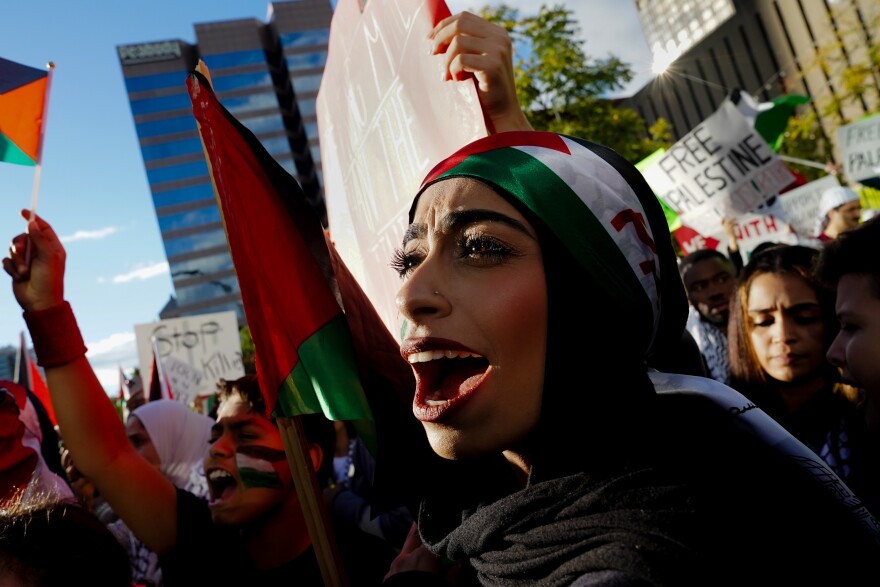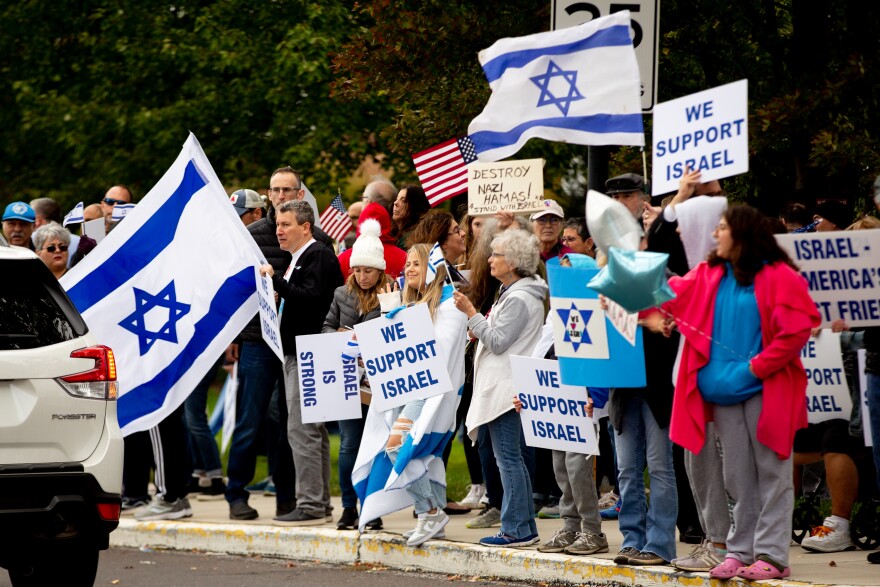In the past 18 days of violence between Israel and Hamas that has plunged the region into full-fledged war, people in the St. Louis area have taken to the streets, prayed, held rallies and lobbied their local governments.
Most of the large public demonstrations have been in support of Palestinians bombarded during Israel’s attacks on Hamas targets in heavily populated areas in Gaza, and in support of their decadeslong struggle for a Palestinian state.
Public responses from elected officials — including a majority of the region's congressional delegation — have been largely supportive of Israel and critical of Hamas, which launched an attack on Israeli settlements on Oct. 7, killing more than 1,400 people and taking more than 200 hostages.
Local pro-Palestinian demonstrators and those who gathered to support Israel, despite their differences, share a message: concern for their loved ones.
“I've lost a village. My family is from there. I have in-laws there right now. We're hoping that they stay safe,” Lena Ramadan, whose family is from Gaza, said at an Oct. 15 downtown St. Louis rally for Palestinians that drew close to 2,000 people. “It's dangerous and it's scary and nobody feels safe.”

Shani Weiss, whose grandfather is a survivor of the Holocaust, worries about members of her family who live in Israel near its border with Gaza.
“They were in their bomb shelters for four days,” Weiss said during a rally of a few hundred people also on Oct. 15 at the Jewish Federation of St. Louis in Creve Coeur. “Thank goodness their town was not infiltrated, but they said everyone knows someone that is, or someone that has been taken hostage or killed.”
In its Oct. 7 attacks, Hamas also launched a barrage of rockets on Tel Aviv.
Since then, Israel has responded with heavy air strikes on Gaza, leveling neighborhoods, and a total blockade of the territory, one of the most densely populated places on Earth with 2.2 million people living in a narrow slice of land, roughly twice the size of St. Louis’ city footprint. The Gaza Health Ministry says Israeli Defense Forces attacks have killed more than 5,000 people, including 2,700 children.
While those who demonstrated for people in the Palestinian territories of Gaza and the West Bank and others who attended rallies for Israel share a sense of concern and loss, their messages also speak to the strong divide over what is occurring and the region’s history of conflict.
"This is something that really has struck a chord with so many people in terms of just the inhumanity that we've witnessed," Weiss said of the Hamas attacks. "The first night when I really understood everything that was happening, honestly, I cried. And that was probably the first time I truly, truly cried after everything that's going on in Israel and having family there."

For Palestinian supporters, the long suffering of people in Gaza and the West Bank is most troubling.
“All Palestinians, everywhere, are under a lot of brutal violence, a lot of aggression,” said Neveen Ayesh, government relations coordinator of the Missouri Chapter of American Muslims for Palestine. “What do we have to do, as a people, to get other people to humanize us? Enough is enough. This is ethnic cleansing.”
In the past two weeks, Palestinians and their supporters have decried Israel’s tactics in response to the Hamas attacks and the support the country has received from U.S. officials, while people in Gaza suffer.
“I feel horror at what's happening. I mourn the death of civilians everywhere,” said Steve Tamari, a member of the St. Louis Palestine Solidarity Committee. “But the reaction has been so out of proportion.”
“The U.S. response shocks me, the immediate cozying up to Israel and frankly, what I see is complicity in the war crimes that Israel is committing now in Gaza,” said Tamari, also a Middle East and Islamic history professor at Southern Illinois University Edwardsville.
Public responses from elected officials, including the majority of the region's congressional delegation, have been largely supportive of Israel and critical of Hamas.

Illinois U.S. Rep. Mike Bost, R-Murphysboro, called the Oct. 7 Hamas attack an “act of violence against religious liberty and democracy” and pledged to support Israel. Republican U.S. Sen. Josh Hawley of Missouri introduced a resolution that in part would have condemned Hamas.
Democratic U.S. Rep. Cori Bush of St. Louis on Oct. 7 called for "ending U.S. government support for Israeli military occupation and apartheid,” comments that spurred criticism from members of her own party. On Oct. 16, she introduced a resolution that called for an immediate ceasefire.
St. Louis Mayor Tishaura Jones has condemned the violence in broad terms.
“Attacks on innocent civilians cannot and must not be justified, full stop,” Jones said Oct. 12. “This kind of violence heals no wounds, and my heart is with St. Louisans whose families and loved ones have been caught up in this latest conflict.”
But a response from the Board of Aldermen was not as inclusive and drew the ire of Palestinian supporters.

At its Oct. 20 meeting, 2nd Ward Alderman Tom Oldenburg introduced a resolution in support of Israel, “as it defends itself against the barbaric war launched by Hamas.”
About 40 people attended the meeting hoping to speak out against the resolution. But the board did not allow them to speak, as it does not take public comments in full session when resolutions are introduced. That would have to occur at committee meetings.
When people in the audience protested, board President Megan Green recessed the meeting and security cleared the chamber.


In recent weeks, Palestinian American demonstrators in St. Louis and in cities around the U.S. have complained that media coverage and U.S. government response has been unflinchingly pro-Israel. (President Joe Biden last week asked Congress for $14 billion in aid to Israel after visiting the country and meeting with Prime Minister Benjamin Netanyahu.)
At the same city board meeting, 14th Ward Alderman Rasheen Aldridge introduced a resolution “to call upon the President of the United States to work towards a cease-fire.”
Both resolutions have been assigned to the board’s legislation and rules committee.
Palestinian supporters are asking for local officials to influence national policy.
“There needs to be an immediate ceasefire. The killing needs to stop,” said Ayesh, of the Missouri Chapter of American Muslims for Palestine. “There are Palestinian Americans trapped in Gaza and the West Bank that are trying to get home to St. Louis.”

But there is not a lot of optimism among supporters of Palestinians or Israelis that peace will come soon, with the Israeli government threatening a ground invasion of Gaza.
“I'm mourning for our people, the Jewish people. I'm mourning for the Palestinians. I'm mourning for all the deaths and the innocent civilians that are going to be lost and the pain that we may not have a solution in the near future, said Joey Abeles, who attended the Oct. 15 rally for Israel. “We have to find a way to peace. It's just a matter of when and how many more people are going to die before it happens.”
St. Louis Public Radio’s Lara Hamdan, Andrea Henderson, Brian Munoz, Wayne Pratt, Emily Woodbury and Brian Heffernan contributed to this report.






